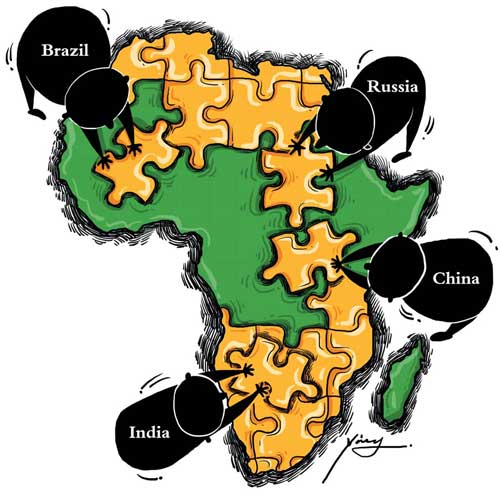BRIC, Africa need to bridge barriers
Updated: 2011-06-17 11:14
By Ahmed Sule (China Daily European Weekly)
 |
On May 11, 2000, The Economist magazine dubbed Africa "the Hopeless Continent" due to its lackluster economic performance, in a feature article titled "Hopeless Africa".
However, in the decade following the publication, Africa has experienced an economic revival with its combined GDP growing at an average rate of 4.5 percent per annum, thus making Africa one of the fastest-growing economic regions in the world.
Trade and investment have played an important role in Africa's economic revival. In recent years, there has been a gradual shift away from trade between African and Western economies toward increased level of trade between Africa and the BRIC (Brazil, Russia, India and China) economies. Africa-BRIC trade is characterized by Africa supplying BRIC economies with natural and mineral resources, to fuel the latter's rapid industrial expansion in exchange for infrastructural development in various projects including railways, roads, hydroelectric power stations and dams.
According to the Standard Bank Group, trade between BRIC nations and Africa increased almost eight times from $21.9 billion (15.2 billion euros) in 2000 to $164.6 billion in 2008, and it is expected to exceed $4 trillion by 2030. In 2010, China overtook the United States as Africa's largest trading partner, while Brazil and India currently rank as Africa's sixth and 10th largest trading partners, respectively. Among the BRIC countries, China dominates BRIC-Africa trade, accounting for about two-thirds of the trade.
The increased level of BRIC-Africa economic engagement has brought several benefits to both parties. This includes infrastructure development, economic expansion and developmental aid for Africa, while the BRIC nations have benefited from access to strategic mineral resources, market access and support from African states at multilateral summits.
As the BRIC countries and Africa continue to reap the benefits of bilateral trade, a number of initiatives such as the Forum on China-Africa Cooperation and the India-Africa Forum Summit have been put in place to foster friendly economic cooperation. There has also been a number of high-profile visits by officials from BRIC economies to Africa. In December 2010, the BRIC countries invited South Africa to join the grouping.
However, despite the increased level of economic engagement and various initiatives to foster harmonious economic cooperation between Africa and the BRIC nations, there have been instances of rising tension and conflict.
Having experienced the ills of colonialism and imperialism in the hands of Western economies, Africans are apprehensive of experiencing exploitation in the hands of the new emerging super powers. Consequently, the increasing economic engagement between the BRIC countries and Africa has resulted in rising tension and claims of exploitation with a number of Africans describing the BRIC economies as the new neo-colonialists. Thabo Mbeki, the former South African president, described China's quest for mineral resources in Africa as a "new form of neo-colonialist adventure". Others have described the BRIC countries' incursion into Africa as the new scramble for Africa.
These conflicts have manifested in various forms. There were protests in Zambia as a result of the death of 50 mine workers in an explosion that took place at the Chinese owned copper mine in Chambishi, which occurred due to lax safety standards. In Nigeria, union members kidnapped 11 Indian steelworkers in 2007 over a pay dispute. There have also been complaints in Gabon and Ghana by environmentalists over the prospecting activities of the Chinese company Sinopec at the national parks.
What are the contributing factors to these conflicts? What factors are hindering BRIC-Africa economic cooperation? How can the Africa-BRIC relationship be improved so as to create a win-win situation for both parties?
As a result of the BRIC countries engagement with Africa, there has been a sizeable flow of foreign direct investment (FDI) into Africa, which often results in the establishment of companies in Africa by BRIC entrepreneurs. The activities of some of these companies have resulted in frictions, particularly in the area of labor relations. Even though these companies employ Africans, in some instances, these companies sometimes operate without regard to the safety and environmental laws of the land, thereby resulting in injuries and sometimes death. Another area of concern is the influx of expatriate workers from the BRIC economies. Very often African governments have signed contracts with the BRIC nations containing clauses that allow for the importation of expatriate staff, despite the availability of local skill sets to perform these roles.
Another factor that has strained cooperation between BRIC and Africa is the impact of their trade on the local industry. As a consequence of Africa opening its market to investment from the BRIC economies, a number of local industries have been unable to compete with the cheap imports coming from the grouping, which eventually results in the demise of these industries. A good example is the case of the textile industries, in which cheap textile imports from China resulted in the loss of hundreds of thousands of jobs in Nigeria, Lesotho and South Africa. The flooding of Chinese goods into a number of African countries has also stifled the development of the African manufacturing sector.
A lack of transparency in dealings between Africa and the BRIC nations also acts as a barrier to a harmonious relationship. One area where the lack of transparency is apparent is in the area of contract negotiation. Some of the contracts agreed between the BRIC nations and the African governments contain "Trojan horse" clauses, which allow for high import content and imported labor, thereby undermining local industries and employment. Furthermore, details of a number of agreements signed between African states and China are not subject to public scrutiny, thereby creating suspicion as to the real motives of these contracts. Very often, aid to African states has been used by the BRIC countries to obtain monopoly rights to the countries' mineral resources. A number of corrupt African government officials also demand bribes before awarding contracts, thereby making it difficult for BRIC investors to operate.
The support to some African regimes by some of the BRIC economies in order to access the countries' resources has often resulted in ill feelings toward BRIC among the citizens of a number of African states. This could backfire.
Furthermore, there appears to be information asymmetry in the dealings between African governments and BRIC. While the BRIC nations know what they want from their engagement with Africa, it is not really clear what Africa hopes to get in return. There is no coherent and holistic African program of engagement with each of the BRIC member countries. As a result of the inability of African governments in adopting a united front when dealing with BRIC, they are unable to exercise a strong bargaining power during negotiations.
In order for a harmonious Africa-BRIC economic cooperation to thrive, both parties will need to consider the following:
African member states should adopt a unified approach in their engagement with BRIC. Rather than engaging separately with each of the BRIC countries, African governments should combine as a single bloc as this will put Africa in a strong bargaining position. African governments should also discuss and develop a BRIC policy, which would spell out what it expects to get out of the Africa-BRIC economic engagement. Furthermore, African governments should set up think tanks or fund research on BRIC with a view of gaining a better understanding of BRIC engagement in Africa.
There should also be more transparency in BRIC-Africa economic engagement. China should provide more information about its foreign aid to Africa, including project costs, loan value, loan terms and repayment conditions. Furthermore, "Trojan horse" clauses contained in contracts, which are detrimental to local employment and industry, should be discouraged. However, allowances should be made for the employment of imported skilled workers where there is a paucity of the relevant skills in the local market. African governments should be more transparent in their operations by discouraging corrupt officials from demanding bribes from BRIC investors.
The BRIC economies will also have to balance their economic objectives with moral responsibility. For BRIC nations to achieve their objective in their economic engagement with Africa, it is important that the populations in countries where they have investments are treated fairly. African governments will have to monitor the activities of its trading partners to prevent instances whereby local industries and employment are undermined.
African governments, in conjunction with BRIC, should work out modalities to enable Africa businesses to access the vast BRIC market. Furthermore, as the BRIC economies continue to move up the manufacturing value chain, African governments should position their economies to exploit the vacuum left by BRIC advancement up the value chain. Africa should also learn from the development models adopted by the BRIC countries and, where feasible, collaborate with them in applying an African solution using the BRIC developmental experience.
The ever-expanding BRIC-Africa economic engagement presents a great opportunity to lift Africa out of poverty and at the same time provides BRIC with access to Africa's strategic resource assets. Bridging the current barriers in trade between the two blocs will go a long way in making the relationship more of a two-way and win-win cooperation.
The author is the macro strategist for Diadem Capital Partners Ltd, London.
E-paper

Pret-a-design
China is taking bigger strides to become a force in fashion.
Lasting Spirit
Running with the Beijingers
A twist in the tale
Specials

Mom’s the word
Italian expat struggles with learning English and experiences the joys of motherhood again.

Lenovo's challenge
Computer maker takes on iconic brand apple with range of stylish, popular products

Big win
After winning her first major title, Chinese tennis star could be marketing ace for foreign brands
